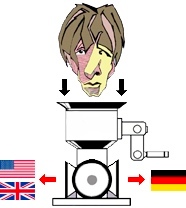| Pages in topic: < [1 2] | Poll: When translating, how often do you turn one sentence into two, or vice versa? Thread poster: ProZ.com Staff
|
|---|
When you translate English to German, the target will be longer than the source, in most cases. A long sentence in English can become an unreadable monster in German, if you stick to the original sentence structure. It is often advisable to make two or three German sentences out of one English sentence, for readability and clarity. But the other case, turning two sentences into one, would be really rare.
| | | | Jennifer_D 
Thailand
Local time: 21:42
English
+ ...
| Sometimes only if needed. | Jul 20, 2020 |
Translating from one language to other is not a word for word thing. Each language has its way of expressing the authors concept in the translated language's own structure.
So, basically stay true to the content, but keep the words and sentences flowing in the natural targeted language.
P. S. Unless instructed otherwise (Transcribing, Ect.)
| | | |
For me, the need comes up most often in bureaucratic documents, where sometimes the sentences run over 100 words long (usually with Spanish as the source language). Important points may get buried because the text is so confused. On the other hand, when the document is well written, I don't try to get too fancy. In a well-written text, each sentence should flow smoothly from the one before and set the stage for the next one.
[Edited at 2020-07-20 21:32 GMT]
| | | | Mario Freitas 
Brazil
Local time: 11:42
Member (2014)
English to Portuguese
+ ...
I care a lot for euphony, and it is necessary sometimes to sound better in the target language. In addition, people very commonly separate totally different sentences with commas instead of periods, and I fix that regularly. Also, there are those 2-mile long sentences, which are terrible, and I split them withount thinking twice.
I wonder why people avoid periods.
| | |
|
|
|
Mario Freitas 
Brazil
Local time: 11:42
Member (2014)
English to Portuguese
+ ...
Sundar Gopalakrishnan wrote:
I never turn one sentence into two, or vice versa. I am always faithful to the sentence structure of the source texts. But other translators do such things. This means they are not competent.
I hope you read all other comments from very competent colleagues to see how wrong your statement was.
| | | | | I can't agree with your view... | Jul 21, 2020 |
Mario Freitas wrote: Sundar Gopalakrishnan wrote:
I never turn one sentence into two, or vice versa. I am always faithful to the sentence structure of the source texts. But other translators do such things. This means they are not competent. I hope you read all other comments from very competent colleagues to see how wrong your statement was.
I can't agree with what you have said, Mr. Mario. I have read all other comments from so-called (and according to you) "very competent colleagues". My statement is not wrong. What do you mean by "very competent" colleagues? I am myself a very competent translator. So why should I look forward to views from other translators in this issue.
We can classify all the texts into two types: 1. Literary texts, 2. Non-literary texts. When you do literary translations (novels, short stories, poems, drama, nonfiction, etc.), you have to be faithful to source texts. Otherwise you can't do justice to translation. For non-literary texts (scientific, technical, legal, medical and other texts, catalogues, instruction manuals, tourist guides, etc.), you need not be faithful. You can split compound and complex sentences, and join simple sentences
By the bye, have you ever translated a literary text? If you did, how did you do it? What did you do, a faithful translation or a beautiful translation? I am just curious to know.
| | | | Jan Truper 
Germany
Local time: 16:42
Member (2016)
English to German
Mario Freitas wrote:
I care a lot for euphony, and it is necessary sometimes to sound better in the target language.
Brazilian Portuguese is my favorite sounding language, ever since I first heard the song "Desafinado" on the Album "Getz/Gilberto". It sounds like the opposite of German
| | | | Lincoln Hui 
Hong Kong
Local time: 22:42
Member
Chinese to English
+ ...
| All the time | Jul 21, 2020 |
Religious adherence to the exact punctuation and sentence structure of the original text is the surest sign of incompetence, especially across languages with very different structures.
[Edited at 2020-07-21 08:24 GMT]
| | |
|
|
|
Lingua 5B 
Bosnia and Herzegovina
Local time: 16:42
Member (2009)
English to Croatian
+ ...
| Depends on situation. | Jul 21, 2020 |
Normally segments in CAT tools are sentences, counting your work from one full stop to another. If that’s a requirement, I need to stick to it.
Otherwise, if sentence style calls for it, I’d do it. If it affects the intended flow and tempo, I wouldn’t do it.
| | | | Kay Denney 
France
Local time: 16:42
French to English
Sundar Gopalakrishnan wrote:
We can classify all the texts into two types: 1. Literary texts, 2. Non-literary texts. When you do literary translations (novels, short stories, poems, drama, nonfiction, etc.), you have to be faithful to source texts. Otherwise you can't do justice to translation. For non-literary texts (scientific, technical, legal, medical and other texts, catalogues, instruction manuals, tourist guides, etc.), you need not be faithful. You can split compound and complex sentences, and join simple sentences
By the bye, have you ever translated a literary text? If you did, how did you do it? What did you do, a faithful translation or a beautiful translation? I am just curious to know.
But you do need to write something that your readers will be able to get their heads round.
I translate the ideas not the words or the punctuation. Whenever I've had to use a new CAT tool, I feel queasy until I have found how to split/join.
I don't see that you need to be a slave to punctuation even in literary texts. You still need to make sure that readers can understand, otherwise why bother to do the translation in the first place?
| | | | Kay Denney 
France
Local time: 16:42
French to English
Jennifer White wrote:
Agree, but isn't that the case for most of the polls here? They just seem to give a platform to those who like to massage their own egos IMO
These polls are just for fun. There are a few translators who delight in answering "I have no need to do marketing" or "I have never handed in a translation late" or "I never make mistakes", and of course it can sound ridiculous after a while. But as a young translator just starting out, I found it comforting to see that it's possible to get to the point where you don't need to market yourself any more, and when faced with reviewing a dozen test translations full of errors, it can also be comforting to get a reminder that there are translators who hold themselves to the highest of standards (they just charge too much for the boss of the agency I worked at to be able to afford a yacht).
| | | | Mario Freitas 
Brazil
Local time: 11:42
Member (2014)
English to Portuguese
+ ...
[quote]Sundar Gopalakrishnan wrote:
Mario Freitas wrote: Sundar Gopalakrishnan wrote:
I never turn one sentence into two, or vice versa. I am always faithful to the sentence structure of the source texts. But other translators do such things. This means they are not competent. I hope you read all other comments from very competent colleagues to see how wrong your statement was. ... By the bye, have you ever translated a literary text? If you did, how did you do it? What did you do, a faithful translation or a beautiful translation? I am just curious to know.
I guess a big laugh will do.
[Edited at 2020-07-23 04:50 GMT]
| | | | | Pages in topic: < [1 2] | To report site rules violations or get help, contact a site moderator: You can also contact site staff by submitting a support request » Poll: When translating, how often do you turn one sentence into two, or vice versa? | Trados Studio 2022 Freelance | The leading translation software used by over 270,000 translators.
Designed with your feedback in mind, Trados Studio 2022 delivers an unrivalled, powerful desktop
and cloud solution, empowering you to work in the most efficient and cost-effective way.
More info » |
| | TM-Town | Manage your TMs and Terms ... and boost your translation business
Are you ready for something fresh in the industry? TM-Town is a unique new site for you -- the freelance translator -- to store, manage and share translation memories (TMs) and glossaries...and potentially meet new clients on the basis of your prior work.
More info » |
|
| | | | X Sign in to your ProZ.com account... | | | | | |





























